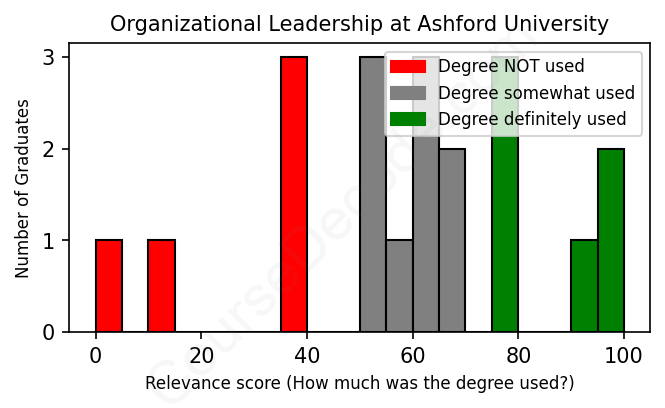
First, some facts. Of the Organizational Leadership graduates from Ashford University we've analyzed , here's how many have used (or NOT used) their degree in their career:

These are estimates based on AI analysis of 20 LinkedIn profiles (see below).
The verdict? Below average. Overall, with an average relevance score of 58%, Organizational Leadership graduates from Ashford University have a lower likelihood (-9%) of finding work in this field compared to the average graduate across all fields:
And for comparison, here's the chart for all profiles we've looked at across all degrees.
Also, after graduating, 40% of these graduates have pursued further education other than another Bachelor's degree (such as a Masters degree or other), compared to the average across all profiles of 35%. This suggests you may need more than just a Bachelors degree to be competitive as a Organizational Leadership graduate.
See the details:
|
Relevance score: 58% We think this person has gone into a career only somewhat relevant to their degree. We think this person has gone into a career only somewhat relevant to their degree.
DEGREE INFOGraduated in 2010 from Ashford University with a Bachelor of Arts (BA) in Organizational Leadership. Also pursued further education since (see below). JOB HISTORY SINCE GRADUATIONSubstitute Teacher Norwich Public Schools Jan 2017 - Jun 2019 Budget / Grant Manager  Norwich Adult Education Jul 2018 - Nov 2021 Grants Manager  Norwich Public Schools Dec 2019 - Nov 2020 Administrative Assistant  Norwich Public Schools Feb 2020 - Present FURTHER DEGREES DONE SINCE GRADUATINGMaster of Business Administration (MBA)Ashford University 2010 - 2013 ABOUTAdept at developing employee relations and building a motivating working environment. Broad and deep knowledge of retention, development and recruitment methodologies. Strong communication skills, capable of linking people, strategy, and performance. Administrative Assistant with over 20+ years of experience, interacting professionally with all levels of staff and maintaining the highest level of confidentiality; known for tact and diplomacy in handling sensitive issues. |
The top 10 most common jobs done by the graduates we've analyzed (ranked most common to least) are:
Based on the job profiles you shared, it seems like a lot of people with a degree in Organizational Leadership from Ashford University have landed roles in management, particularly in healthcare, education, and military contexts. Many of these roles, like Vice President positions in health systems and various management roles in the military, require strong leadership and organizational skills — which is spot on for what you'd expect from an Organizational Leadership degree. These jobs typically involve overseeing teams, guiding departments, or implementing policies, all of which are heavily tied to the skills learned in their studies.
However, not every job fits this mold. Some graduates have taken on roles that don't really utilize the specific knowledge from their degree, like Substitute Teachers or Administrative Assistants, where the focus is more on day-to-day tasks rather than leadership. Additionally, technical jobs like Cyber Security Engineer or roles in customer service at places like Macy's tend to stray further from the core principles of Organizational Leadership. In summary, while many have found relevant positions that align well with their studies, there's also a noticeable number who have taken on roles that don't fully engage the leadership skills they developed during their education.
Here is a visual representation of the most common words in job titles for Organizational Leadership graduates (this is across all Organizational Leadership graduates we've analyzed, not just those who went to Ashford University):

Looking at the career paths of graduates from Ashford University with degrees in Organizational Leadership, it seems like there's a mix of outcomes, but many have indeed landed roles that align well with their studies. For many, their first job out of college was often related to management or support roles, such as training managers, grant managers, or administrative positions. Over the next five to ten years, several have progressed into higher-level management or specialized roles in their fields, demonstrating a clear trajectory toward positions of leadership. For instance, some have moved up to roles like Director of Facilities Management or Operations Manager, while others have taken on significant responsibilities within the military or healthcare sectors.
However, not all graduates have followed such a straightforward path. Some have ended up in positions that don't seem directly related to organizational leadership, such as customer service roles or administrative support within educational institutions. This suggests that while many graduates find relevant and fulfilling careers, there are instances where individuals might struggle to find their niche or leverage their degree effectively in the job market. Overall, those who graduated earlier tended to have more impressive advancements, often finding themselves in executive roles or specialized positions as they gained experience. So, if you're considering this degree, it seems like there's good potential for a meaningful career, but as with any path, individual results may vary.
Hey there! So, a Bachelor’s degree in Organizational Leadership, whether at Ashford University or elsewhere, is generally considered to be on the more manageable side of things. It's not rocket science, but that doesn't mean it's a walk in the park either. You’ll cover some important concepts around teamwork, communication, and decision-making, which can be really interesting and practical. The coursework usually involves a mix of group projects, presentations, and writing assignments, so if you're not super into that, it might feel a bit more challenging. Overall, if you stay organized and keep up with your studies, it’s definitely doable!
Most commonly, in the LinkedIn profiles we've looked at, it takes people 2 years to finish a Bachelor degree in Organizational Leadership.
Diving into the LinkedIn profiles of these organizational leadership graduates from Ashford University, you can tell that the financial outcomes vary widely. The ones who climbed into more senior positions, especially in healthcare and governmental roles (like Vice President or Chief Executive Officer), likely pulled in decent salaries, probably well into the six figures, given their responsibilities. On the other hand, those in education or entry-level roles, like substitute teachers or administrative assistants, probably aren't seeing the same level of pay, especially if they’ve stayed in those positions for a while. So, if you want to bag a good salary, aiming for leadership roles in established industries seems like the way to go!
Here is a visual representation of the most common words seen in the "about" section of LinkedIn profiles who have a Bachelor degree in Organizational Leadership (this is across all Organizational Leadership graduates we've analyzed, not just those who went to Ashford University). This may or may not be useful:

Here are all colleges offering a Bachelor degree in Organizational Leadership (ordered by the average relevance score of their Organizational Leadership graduates, best to worst) where we have analyzed at least 10 of their graduates:
| College | Score | Count |
|---|---|---|
 Texas A&M University-Commerce Texas A&M University-Commerce
|
74 | 16 |
 Arizona State University Arizona State University
|
72 | 23 |
 University of Louisville University of Louisville
|
69 | 10 |
 Purdue University Purdue University
|
67 | 12 |
 University of Charleston University of Charleston
|
67 | 17 |
 University of Cincinnati University of Cincinnati
|
66 | 13 |
 Trident University International Trident University International
|
65 | 10 |
 South Texas College South Texas College
|
65 | 11 |
 Southern Nazarene University Southern Nazarene University
|
63 | 15 |
 Ashford University Ashford University
|
58 | 20 |
 Azusa Pacific University Azusa Pacific University
|
58 | 11 |
 Northern Kentucky University Northern Kentucky University
|
57 | 25 |
 Wright State University Wright State University
|
52 | 24 |